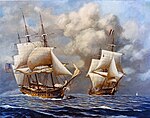
Quasi-War
Undeclared naval war between France and the US, 1798–1800 / From Wikipedia, the free encyclopedia
Dear Wikiwand AI, let's keep it short by simply answering these key questions:
Can you list the top facts and stats about Quasi-War?
Summarize this article for a 10 year old
The Quasi-War (French: Quasi-guerre) was an undeclared naval war fought from 1798 to 1800 between the United States and the French First Republic, primarily in the Caribbean and off the East Coast of the United States.
| Quasi-War | |||||||
|---|---|---|---|---|---|---|---|
| Part of the French Revolutionary Wars | |||||||

 Left: USS Constellation vs L'Insurgente; right: U.S. Marines from USS Constitution boarding and capturing French privateer Sandwich | |||||||
| |||||||
| Belligerents | |||||||
| |||||||
| Commanders and leaders | |||||||
| Strength | |||||||
| British: Unknown | Unknown | ||||||
| Casualties and losses | |||||||
|
| ||||||
In 1793, Congress suspended repayment of French loans incurred during the American Revolutionary War. The dispute escalated further due to different interpretations of the 1778 treaties of Alliance and Commerce between the two countries. France, then engaged in the 1792–1797 War of the First Coalition, which included Great Britain, viewed the 1794 Jay Treaty between the United States and Britain as incompatible with those treaties, and retaliated by seizing American ships trading with Britain.
Diplomatic negotiations failed to resolve these differences, and in October 1796 French privateers began attacking merchant ships sailing in American waters, regardless of nationality. The dissolution of Federal naval forces following independence left the US unable to mount an effective response and by October 1797, over 316 American ships had been captured. In March 1798, Congress reassembled the United States Navy and in July authorized the use of military force against France.
In addition to a number of individual ship actions, by 1799 American losses had been significantly reduced through informal cooperation with the Royal Navy, whereby merchant ships from both nations were allowed to join each other's convoys. Diplomatic negotiations between the US and France continued, and the establishment of the French Consulate in November 1799 led to the Convention of 1800, which ended the war.
The ability of Congress to authorize military action without a formal declaration of war was later confirmed by the Supreme Court and formed the basis of many similar actions since, including American participation in the Vietnam War and the 1991 Gulf War.[5][lower-alpha 1]